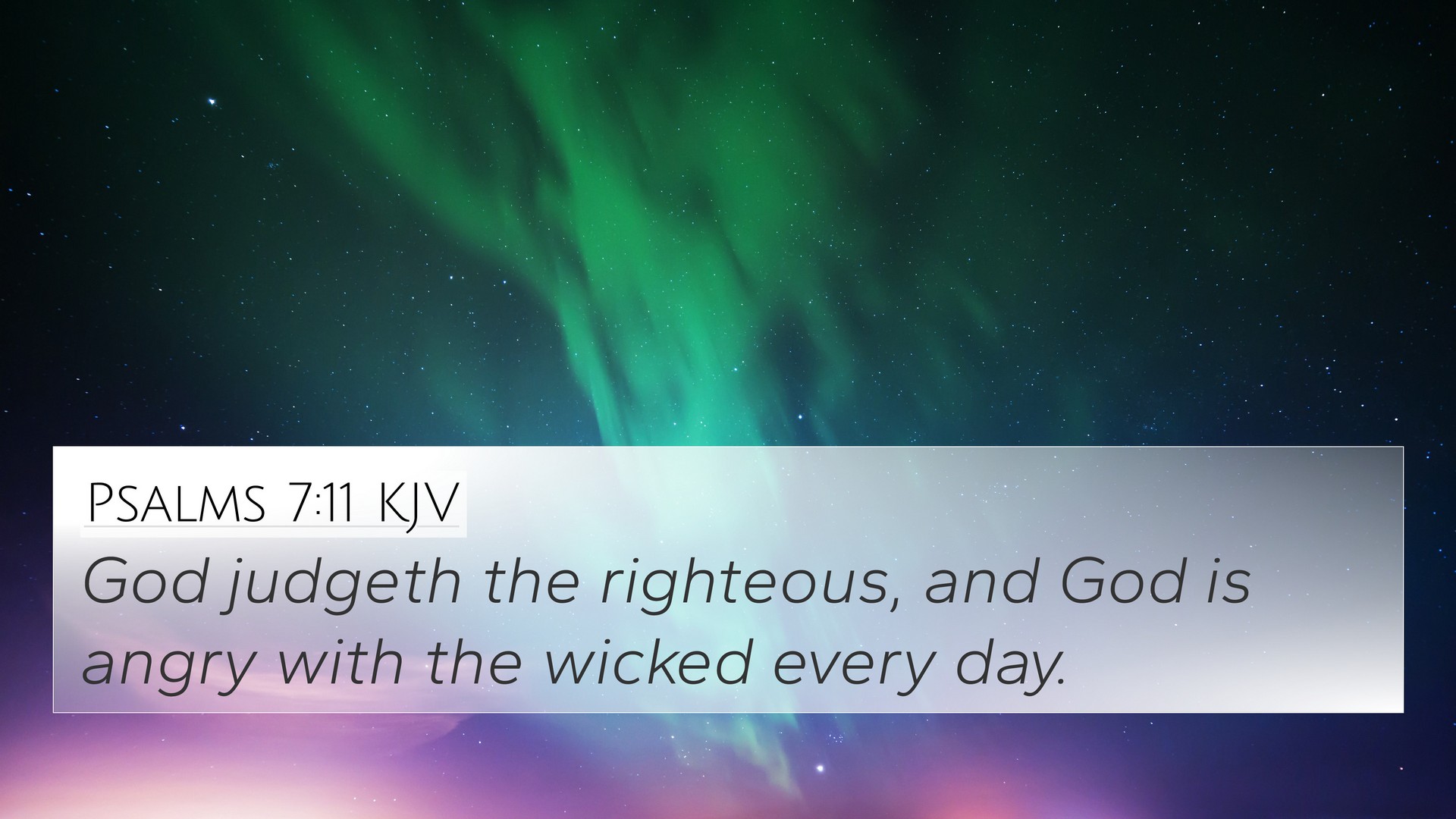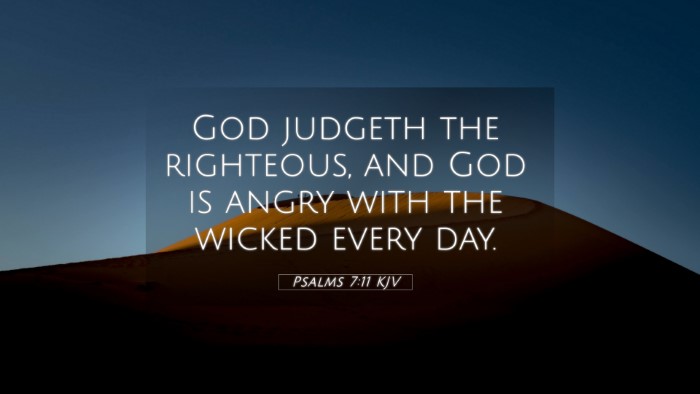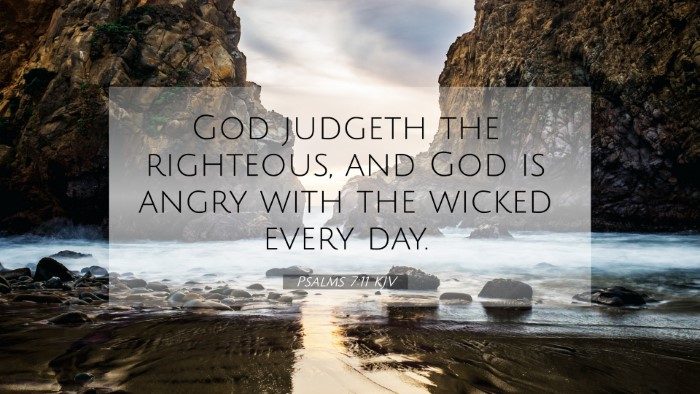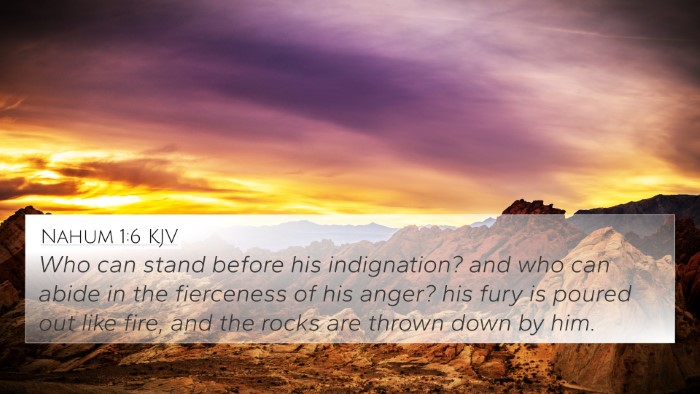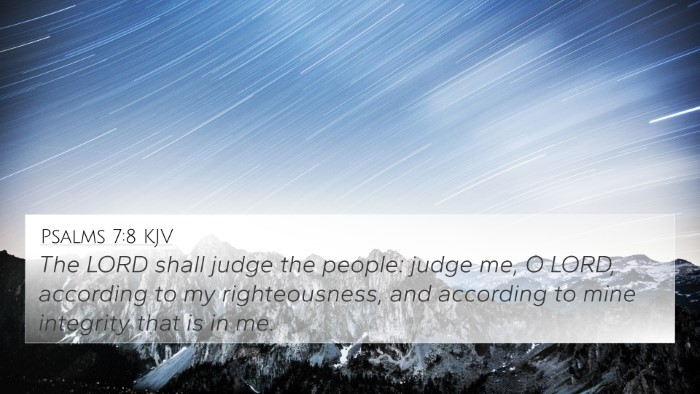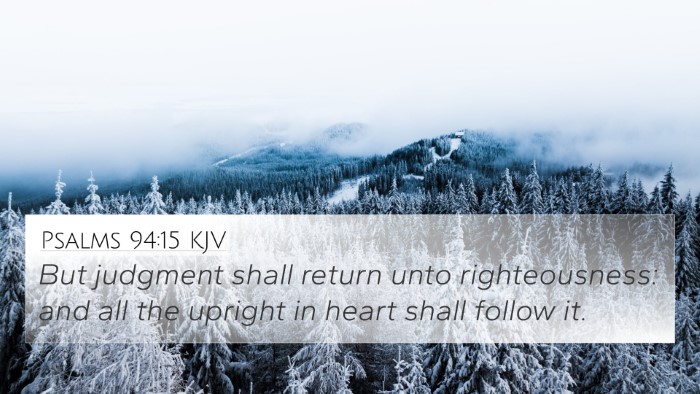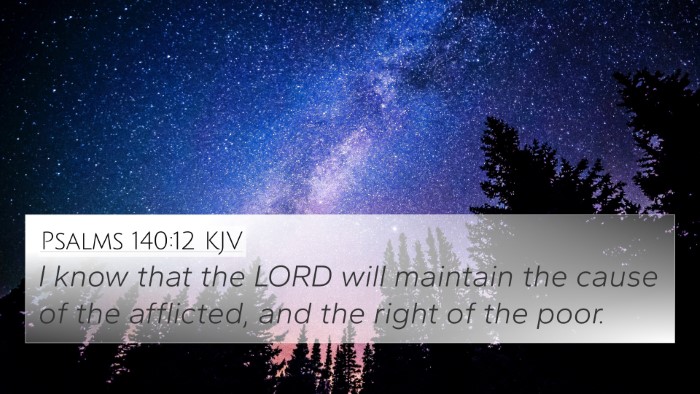Psalms 7:11 - Summary and Interpretation
Bible Verse: Psalms 7:11 states, "God is a just judge, and God is angry with the wicked every day."
Understanding the Verse
This verse highlights two main attributes of God: His justice and His righteousness. The psalmist emphasizes that God, as a judge, scrutinizes human actions and holds the wicked accountable for their sins. Several public domain commentaries provide insights that help in understanding the implications of this scripture.
Key Themes and Concepts
- God's Justice: The verse conveys God’s impartiality in judgment, aligning with the nature of divine justice found throughout the Scriptures.
- Divine Anger: The mention of God being angry daily with the wicked points to God's active engagement with injustice, a theme echoed in various biblical texts.
- Accountability: The wicked will ultimately be held accountable for their actions, suggesting a call for repentance and awareness of God's constant vigilance.
Insights from Commentaries
Matthew Henry notes that God's anger is not a capricious emotion but is rooted in His justice and holiness. The wicked, seen as those who perpetuate corruption and wrongdoing, provoke God’s righteous wrath. Henry emphasizes that such divine anger is a call to repentance and a warning to the sinner.
Albert Barnes describes God’s description as "a just judge" as an affirmation of His moral authority. This reinforces the biblical doctrine that God cannot overlook sin. Barnes points out the daily aspect of God’s anger, suggesting that with each day the wicked have an opportunity for change but also face the ongoing risk of divine rejection if they remain unrepentant.
Adam Clarke contributes by exploring the implications of divine judgment. He highlights that God’s anger is an expression of His righteousness and that there’s an open invitation for the wicked to turn from their ways. Clarke situates this verse within the larger narrative of psalms that call for justice and emphasize God’s sovereignty over all creation.
Cross-References
Psalms 7:11 can be cross-referenced with several key scriptures that enhance our understanding of its message:
- Romans 1:18: "For the wrath of God is revealed from heaven against all ungodliness and unrighteousness of men."
- Proverbs 11:21: "Though hand join in hand, the wicked shall not be unpunished."
- John 3:36: "He who believes in the Son has everlasting life; and he who does not believe the Son shall not see life, but the wrath of God abides on him."
- Revelation 20:15: "And anyone not found written in the Book of Life was cast into the lake of fire."
- Psalm 9:17: "The wicked shall be turned into hell, and all the nations that forget God."
- Ecclesiastes 12:14: "For God will bring every work into judgment, including every secret thing, whether good or evil."
- Isaiah 5:25: "Therefore, the anger of the Lord was aroused against His people; He stretched out His hand against them."
- 2 Thessalonians 1:6: "Since it is a righteous thing with God to repay with tribulation those who trouble you."
- Jeremiah 17:10: "I, the Lord, search the heart, I test the mind, even to give every man according to his ways."
- Nahum 1:2: "God is jealous, and the Lord avenges; the Lord avenges and is furious."
Thematic Connections
The themes of justice, accountability, and divine anger found in Psalms 7:11 can be connected to several significant doctrines within Scripture:
- The Character of God: Understanding God as just and righteous provides a foundation for Christian ethics and morality.
- Repentance and Salvation: The consistent biblical call for repentance is underscored by the recognition of divine wrath awaiting the unrepentant.
- End Times Judgment: The eschatological implications of divine judgment remind believers of a future accountability before God.
Conclusion
Psalms 7:11 serves as a solemn reminder of God's role as a just judge who responds to wickedness with righteous indignation. The insights from various public domain commentaries present a comprehensive understanding of the verse while its cross-references allow for deeper theological reflections.
This peering into scriptural connections reveals the richness of the Bible's teachings on justice, accountability, and God's characteristics as revealed through scripture. The study of Psalms 7:11, therefore, becomes a stepping stone for deeper theological exploration through the means of cross-referencing biblical texts.
Further Exploration
For those interested in how to approach cross-referencing Biblical texts, consider using tools such as a Bible concordance or a cross-reference guide. These resources help to uncover inter-Biblical dialogues, identifying connections between Old and New Testament writings, and exploring thematic Bible verse connections.
